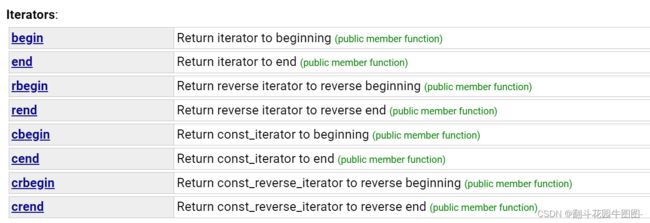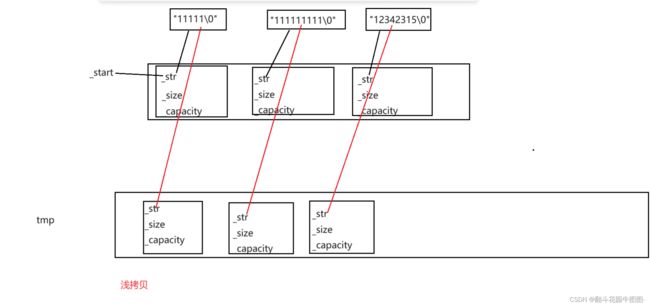Vector简单实现
一、vector的介绍和使用
1.1 vector的介绍
在我个人理解中,我把它看成一个数组,只不过可以存你所需要的各种内置类型或自定义类型
迭代器相关
容量相关
shrink_to_fit是缩容
访问元素
修改元素
1.2vector的使用
和之前介绍的string类似,或者说类模板的使用基本类似
void test_vector1()
{
vector v;
v.push_back(1);
v.push_back(2);
v.push_back(3);
v.push_back(4);
// vector
// string
//
for (size_t i = 0; i < v.size(); i++)
{
cout << v[i] << " ";
}
cout << endl;
vector::iterator it1 = v.begin();
while (it1 != v.end())
{
cout << *it1 << " ";
++it1;
}
cout << endl;
for (auto e : v)
{
cout << e << " ";
}
cout << endl;
} 二、vector的模拟实现以及刨析
框架
namespace xxx
{
template
class vector
{
private:
iterator _start;
iterator _finish;
iterator _end_of_storage;
};
}
迭代器
typedef T* iterator;
typedef const T* const_iterator;
iterator begin()
{
return _start;
}
iterator end()
{
return _finish;
}
const_iterator begin() const
{
return _start;
}
const_iterator end() const
{
return _finish;
}构造、析构和重载=
// construct and destroy
vector()
:_start(nullptr)
, _finish(nullptr)
, _end_of_storage(nullptr)
{}
vector(int n, const T& v = T())
:_start(nullptr)
, _finish(nullptr)
, _end_of_storage(nullptr)
{
reserve(v.capacity());
for (auto e : v)
{
push_back(e);
}
}
vector(const vector& v)
{
_start = new T[v.capacity()];
memcpy(_start, v._start, sizeof(T) * v.size());
_finish = _start + v.size();
_end_of_storage = _start + v.capacity();
}
//迭代器区间构造
template
vector(InputIterator first, InputIterator last)
{
while (first != last)
{
push_back(*first);
++first;
}
}
vector& operator= (vector v)
{
swap(v);
return *this;
}
~vector()
{
if (_start)
{
delete[] _start;
_start = _finish = _end_of_storage = nullptr;
}
} 有效个数、扩容和resize
size_t size() const
{
return _finish - _start;
}
size_t capacity() const
{
return _end_of_storage - _start;
}扩容
注意:这个reserve有问题稍后会提到
void reserve(size_t n)
{
if (n > capacity())
{
size_t old_size = size();
T* tmp = new T[n];
if (_start)
{
memcpy(tmp, _start, old_size * sizeof(T));
delete[] _start;
}
_start = tmp;
_finish = _start + old_size;
_end_of_storage = _start + n;
}
}
void resize(size_t n, const T& value = T())
{
if (n > size())
{
reserve(n)
while (_finish < _start + n)
{
*_finish = value;
++_finish;
}
}
else
{
_finish = _start + n;
}
}元素访问
注意访问位置不得超过有效数据范围
T& operator[](size_t pos)
{
assert(pos < size());
return _start[pos];
}
const T& operator[](size_t pos)const
{
assert(pos < size());
return _start[pos];
}修改元素
尾插和尾删
void push_back(const T& x)
{
if (_finish == _end_of_storage)
{
size_t newcapacity = capacity() == 0 ? 4 : capacity() * 2;
reserve(newcapacity);
}
*_finish = x;
++_finish;
}
void pop_back()
{
assert(size() > 0);
--_finish;
}
swap交换
void swap(vector& v)
{
std::swap(_start, v._start);
std::swap(_finish, v._finish);
std::swap(_end_of_storage, v._end_of_storage);
}
在某位置插入、删除
注意:这里涉及到迭代器失效以及深浅拷贝的问题
void insert(iterator pos, const T& x)
{
assert(pos >= _start);
assert(pos <= _finish);
if (_finish == _end_of_storage)
{
//异地扩容_start会指向别的空间,pos的位置要记好
size_t len = pos - _start;
size_t newcapacity = capacity() == 0 ? 4 : capacity() * 2;
reserve(newcapacity);
pos = _start + len;
}
memmove(pos + 1, pos, sizeof(T) * (_finish - pos));
*pos = x;
_finish++;
}
void erase(iterator pos)
{
assert(pos >= _start);
assert(pos <= _finish);
iterator it = pos + 1;
while(it < _finish)
{
*(it-1) = *it;
++it;
}
_finish--;
}三、问题刨析
迭代器的主要作用就是让算法不用关心底层数据结构,底层可以理解为封装了一个指针
迭代器失效就是底层指针指向的空间已经被释放(会导致程序崩溃)
引起底层空间改变(例:扩容)的操作都有可能导致迭代器失效
3.1迭代器失效
 pos = _start+len;记录距离,并没有彻底的解决问题
pos = _start+len;记录距离,并没有彻底的解决问题
外部的insert可能失效
v.insert(it,20);防不了这个,pos是it给的,内部的pos改变影响不了it,迭代器还是失效了
第二种失效
删除所有的偶数
void test_vector()
{
vector v;
v.push_back(1);
v.push_back(2);
v.push_back(3);
v.push_back(4);
v.push_back(4);
v.push_back(4);
v.push_back(5);
v.push_back(6);
//v.push_back(7);
for (auto e : v)
{
cout << e << " ";
}
cout << endl;
vector::iterator it = v.begin();
while (it != v.end())
{
if (*it % 2 == 0)
{
v.erase(it);
}
++it;
}
for (auto e : v)
{
cout << e << " ";
}
cout << endl;
}
vector::iterator it = v.begin();
while (it != v.end())
{
if (*it % 2 == 0)
{
it = v.erase(it);
}
else
{
++it;
}
}
erase删除pos位置元素后,pos位置之后的元素会往前移动,没有导致底层空间的改变,理论上讲迭代器不会失效,但是如果pos位置刚好是最后一个元素,删完之后pos刚好是end的位置,而end的位置是没有有效元素的,那么pos就失效了。
迭代器失效后,代码并不一定会崩溃,如果it不在begin和end范围内,肯定会崩溃。
结论:insert和erase形参pos都可能会失效
原则是insert和erase过的迭代器不要使用
iterator erase(iterator pos)
{
assert(pos >= _start);
assert(pos < _finish);
iterator it = pos + 1;
while (it < _finish)
{
*(it - 1) = *it;
++it;
}
_finish--;
return pos;
}3.2深浅拷贝问题
reserve中我们使用memcpy这个是浅拷贝
当vector存的是内置类型是这里没什么问题
但是如果是string等自定义类型就要出问题了
比如说
vector vstr; 那就会这样
reserve完会调用(string的)析构,string就会释放就空间,然而下面tmp的_str害指向那块空间呢
寄!
void reserve(size_t n)
{
if (n > capacity())
{
size_t old = size();
T* tmp = new T[n];
if (_start)
{
//memcpy(tmp, _start, old * sizeof(T));浅拷贝
for (size_t i = 0; i < old; i++)
{
tmp[i] = _start[i];
}
delete[] _start;
}
_start = tmp;
_finish = _start + old;
_endofstorage = _start + n;
}
}insert插入
insert也用了memmove如果
iterator insert(iterator pos, const T& x)
{
assert(pos >= _start && pos <= _finish);
if (_finish == _endofstorage)
{
size_t len = pos - _start;
reserve(capacity() == 0 ? 4 : capacity() * 2);
pos = _start + len;//迭代器失效
}
//memmove(pos + 1, pos, sizeof(T) * (_finish - pos)); 浅拷贝
iterator end = _finish - 1;
while (end >= pos)
{
*(end + 1) = *end;
--end;
}
*pos = x;
++_finish;
return pos;
}四、全部代码
#pragma once
#include
namespace xxx
{
template
class vector
{
public:
// Vector的迭代器是一个原生指针
typedef T* iterator;
typedef const T* const_iterator;
iterator begin()
{
return _start;
}
iterator end()
{
return _finish;
}
const_iterator begin() const
{
return _start;
}
const_iterator end() const
{
return _finish;
}
// construct and destroy
vector()
:_start(nullptr)
, _finish(nullptr)
, _end_of_storage(nullptr)
{}
vector(int n, const T& v = T())
{
resize(n,v);
}
vector(const vector& v)
{
reserve(v.capacity());
for (const auto& e : v)
{
push_back(e);
}
}
//迭代器区间构造
template
vector(InputIterator first, InputIterator last)
{
while (first != last)
{
push_back(*first);
++first;
}
}
vector& operator= (vector v)
{
swap(v);
return *this;
}
~vector()
{
if (_start)
{
delete[] _start;
_start = _finish = _end_of_storage = nullptr;
}
}
// capacity
size_t size() const
{
return _finish - _start;
}
size_t capacity() const
{
return _end_of_storage - _start;
}
void reserve(size_t n)
{
if (n > capacity())
{
size_t old = size();
T* tmp = new T[n];
if (_start)
{
//memcpy(tmp, _start, old * sizeof(T)); 浅拷贝
for (size_t i = 0; i < old; i++)
{
tmp[i] = _start[i];
}
delete[] _start;
}
_start = tmp;
_finish = _start + old;
_end_of_storage = _start + n;
}
}
void resize(size_t n, const T& value = T())
{
if (n > size())
{
reserve(n);
while(_finish < _start + n)
{
*_finish = value;
++_finish;
}
}
else
{
_finish = _start + n;
}
}
///access///
T& operator[](size_t pos)
{
assert(pos < size());
return _start[pos];
}
const T& operator[](size_t pos)const
{
assert(pos < size());
return _start[pos];
}
///modify/
void push_back(const T& x)
{
if (_finish == _end_of_storage)
{
size_t newcapacity = capacity() == 0 ? 4 : capacity() * 2;
reserve(newcapacity);
}
*_finish = x;
++_finish;
}
void pop_back()
{
assert(size() > 0);
--_finish;
}
void swap(vector& v)
{
std::swap(_start, v._start);
std::swap(_finish, v._finish);
std::swap(_end_of_storage, v._end_of_storage);
}
iterator insert(iterator pos, const T& x)
{
assert(pos >= _start && pos <= _finish);
if (_finish == _end_of_storage)
{
size_t len = pos - _start;
reserve(capacity() == 0 ? 4 : capacity() * 2);
pos = _start + len;
}
//memmove(pos + 1, pos, sizeof(T) * (_finish - pos));
iterator end = _finish - 1;
while (end >= pos)
{
*(end + 1) = *end;
--end;
}
*pos = x;
++_finish;
return pos;
}
iterator erase(iterator pos)
{
assert(pos >= _start);
assert(pos < _finish);
iterator it = pos + 1;
while (it < _finish)
{
*(it - 1) = *it;
++it;
}
_finish--;
return pos;
}
private:
iterator _start;
iterator _finish;
iterator _end_of_storage;
};
}







